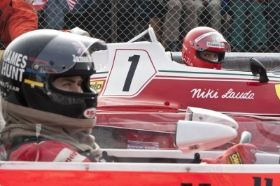 Yes, there are some moments in sports that prompt a broadcaster to exclaim, “That was so amazing, even Hollywood couldn’t have written it better!” But chances are, when they are reaching all the way back to 1976 for a true story that hasn’t been put to film before, there might have been the need to “goose” the details a bit, for excitement’s sake. It may not have been quite the humdinger of a pulse-quickener on its own—the “instant classic” in today’s parlance—to permeate popular culture with such relevance that it needed three-plus decades to simmer in our consciousness before being put to screen. Ah, hell, forget all that, Rush is a racing movie, Chris Hemsworth, aka Thor, is drop-dead gorgeous, and director Ron Howard puts every bit of his Backdraft muscle-memory to use here in creating a made-for-the-guys, looks-good-for-the-ladies movie that is a solid and entertaining, if a bit empty, piece of Hollywood moviemaking.
Yes, there are some moments in sports that prompt a broadcaster to exclaim, “That was so amazing, even Hollywood couldn’t have written it better!” But chances are, when they are reaching all the way back to 1976 for a true story that hasn’t been put to film before, there might have been the need to “goose” the details a bit, for excitement’s sake. It may not have been quite the humdinger of a pulse-quickener on its own—the “instant classic” in today’s parlance—to permeate popular culture with such relevance that it needed three-plus decades to simmer in our consciousness before being put to screen. Ah, hell, forget all that, Rush is a racing movie, Chris Hemsworth, aka Thor, is drop-dead gorgeous, and director Ron Howard puts every bit of his Backdraft muscle-memory to use here in creating a made-for-the-guys, looks-good-for-the-ladies movie that is a solid and entertaining, if a bit empty, piece of Hollywood moviemaking.
There’s really not even a lot of pretense here. There’s no “based on a true story” card at the beginning of the movie (even though it is), and there are no summary cards at the end, filling in the audience on the “where are they now” of the characters, as per usual for movies based on real people and events, as Rush is. But from the beginning, even though I knew nothing going in about 1970s Formula One race car drivers James Hunt and Niki Lauda, their cinematic stories felt stretched and exaggerated. I wasn’t sure how or why, but I just knew I was experiencing some genuine artistic license. I’m not saying this is a bad thing, I’m just saying this sets you up for a different kind of experience. As an audience member, you let yourself go down the director’s path of telling their stories, you allow yourself to be set up to be told a story, knowing you will be manipulated and you either buy into that or not. And for Rush, it works, for the most part, because the movie doesn’t bite off more than it can chew and it doesn’t pretend to be more than it is. All artistic license is taken to serve the greater good of the story: raising the stakes of the car race sequences. And isn’t this what we came to see?
The racing scenes are done well, director Howard knows what he’s doing and film editor Daniel P. Hanley has an Oscar for a reason. The Formula One racetracks of the 1970s are fun to see on film, and watching these classic racecars speed around the tracks feels somewhere between a video game and Top Gun and gets the adrenaline pumping. There’s only so much amped-up carborators and tire-squealing you can take, however, so the majority of the movie is set off the track, and here’s where the movie often hits the brakes. Not through any fault, however, of the two lead actors, Chris Hemsworth and Daniel Brühl, who play rival drivers James Hunt and Niki Lauda. I finally see what all the fuss is about with Hemsworth, not having been impressed with him in any of his previous roles. But here he is all charm and blue eyes and is cast perfectly as the handsome English playboy driver whose cockiness, arrogance and success drove his rival, Austrian Niki Lauda, the reserved, unattractive, introspective and competitive Formula One champion to defend his title with the fiercest of wills. Daniel Brühl plays Lauda with a simmering boil, allowing us to get just beneath the surface of this enigmatic character but never under the skin, reminding us what makes a race car driver really tick—what makes someone climb into a bomb on wheels—is something we’ll never know. I really love what he does with the character—it’s nice to see a sympathetic character who’s not necessarily played as likeable. Hollywood could learn to do more of this.
But even though both of these actors are absolutely terrific to watch, their performances are ultimately overwhelmed by the inevitable Hollywood-ness of the script, the one that has to, in the end, remind us, over and over, how dangerous this sport is, and remind us that one—or both!—of these guys that we have gotten to know—and love!—could get hurt—or die!!!—during any one of these races or any time they get into one of these cars. The piling on of the dramatic tension gets just too much and the artistic license they take with the manipulation of some of the “real” events is outrageous, but let’s not be too surprised. In the end, Rush is as classic a Hollywood movie as you’re going to get, with all the speed, beauty, strong performances and high energy that you love, and all the manipulating, pandering and predictability that you hate. But, let’s just say the highs are much higher than the lows. And damn if I wasn’t wrong about Hemsworth.
